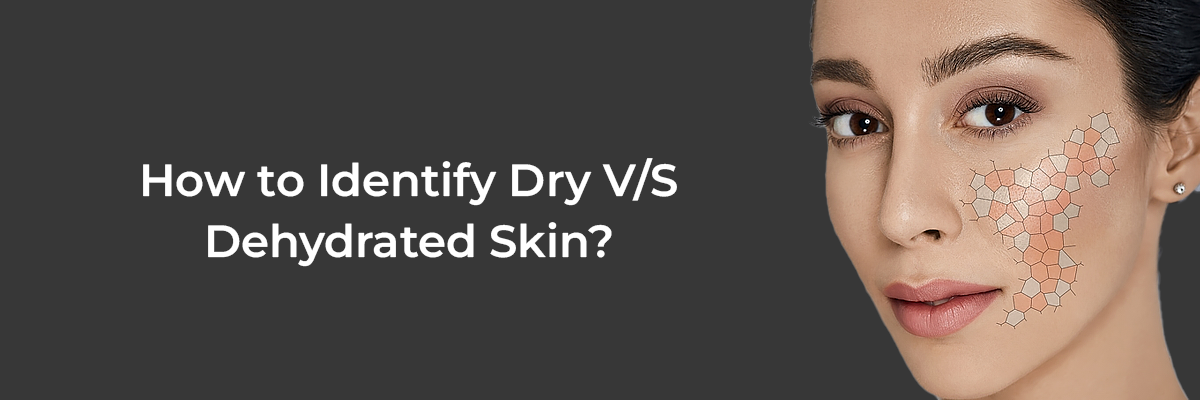Dry skin is a common problem. Every other woman may be complaining about it. Be it winter or summer, indoors or outdoors. But did you know that a large chunk of these women may actually be suffering from dehydrated skin and not identify it? Yes, most of us can confuse the signs of dehydrated skin with dry skin because that’s all that’s shown in the popular media — in ads and hoardings.
That is why we are here with a detailed difference between the two. Here’s how to identify dry skin v/s dehydrated skin.
Dry Skin: a skin type
- The skin is considered dry when it lacks oil.
- The sebum production may be down due to genetic reasons, the weather, or medications.
- That is why, dry skin is a skin type too, because it may be genetic, and you can do nothing to alter that.
- Dry skin may feel tight, have dry patches, flake when it is excessively dry etc.
- If dry skin is your skin type, then you can build your skincare routine in such a way that your skin’s lack of oil and moisture is supplemented from outside sources like moisturisers, serums etc.
Dehydrated Skin: a skin condition
- The skin is considered dehydrated when it lacks water.
- Dehydrated skin is not something you are born with. On the contrary, it is something that develops over time due to certain activities that you may be indulging in — like drinking very little water, not exfoliating your skin, applying makeup very frequently without cleaning well etc.
- Dehydrated skin may look dull, dry, and even red sometimes. It may feel tight, it may feel irritated. You may experience breakouts due to dehydrated skin too.
- Fun fact: oily skin can be dehydrated too! In fact, the more oil your skin produces, the more likely you may be to have skin that is parched for hydration.
Oily & Dehydrated Skin
The logic of the skin's oil production is to keep it moist. When you do not moisturise your oily skin, it senses that there is a lack of moisture. To correct this, your already oily skin produces more oil. This excess oil leads to a host of other problems like — acne, breakouts, inflamed skin, blackheads, greasy skin and melting makeup.
Causes of Dehydrated Skin:
- Prolonged and unprotected sun exposure
- Chlorine exposure (when swimming)
- Withholding water consumption
- Heat
- Very dry weather
- Overconsumption of alcohol
- Smoking
- Using the wrong skincare products for your skin type
- Over exfoliation as well as lack of exfoliation
All the above, in one way or another, lead to the skin’s moisture barrier being compromised. This results in the skin not being able to absorb the moisture that it needs. That is why it gets parched.
How to Identify Dry V/S Dehydrated Skin?
Take the Pinch Test:
- Pinch some skin on your cheek, or chest, or abdomen or the back of the hand.
- Hold for a count of 5 seconds and release.
- If the skin returns immediately to its original form then you may not be dehydrated.
- If it takes a second or two to bounce back, then you are.
If you find out that your skin is not dehydrated but you still feel it tight and dry and feel it all the time, then it is likely that you have a dry skin type.
TREATMENTS:
Treatment for Dry Skin
- Use a heavy and creamy moisturiser all through the year to replenish the lack of oil in your skin.
- You may also use an oil-based moisturiser if your skin permits.
- Apply a hydrating cream mask at least once a week to fortify your skin and keep it supple.
- Exfoliate regularly to remove all layers of dead skin cells that may cause extra dullness.
- Use a hydrating night serum with ingredients like glycerin, hyaluronic acid etc.
Treatment for Dehydrated Skin
- Drink lots of water and try and stay away from diuretics like coffee and alcohol.
- Eat more crisp greens, water-heavy fruits like watermelon, and good fats.
- Use a moisturising sunscreen to protect your skin’s barrier from being damaged further.
- Use products rich in ceramides and hyaluronic acid to manage your irritated skin.
- Equip your home with a humidifier.
- Get a hydrating facial to massage all the moisturising ingredients into your skin and revive it.
If you are suffering from dehydrated skin, you should book a hydrating facial. Expert service and professional treatment will do wonders to help you recover from this skin condition. Supplement this with a lifestyle change as described above and you will find your skin looking much healthier and better soon. Contact Savarnas Beauty Spa for the best hydrating facial for your skin. Book now to get your desired slot.













